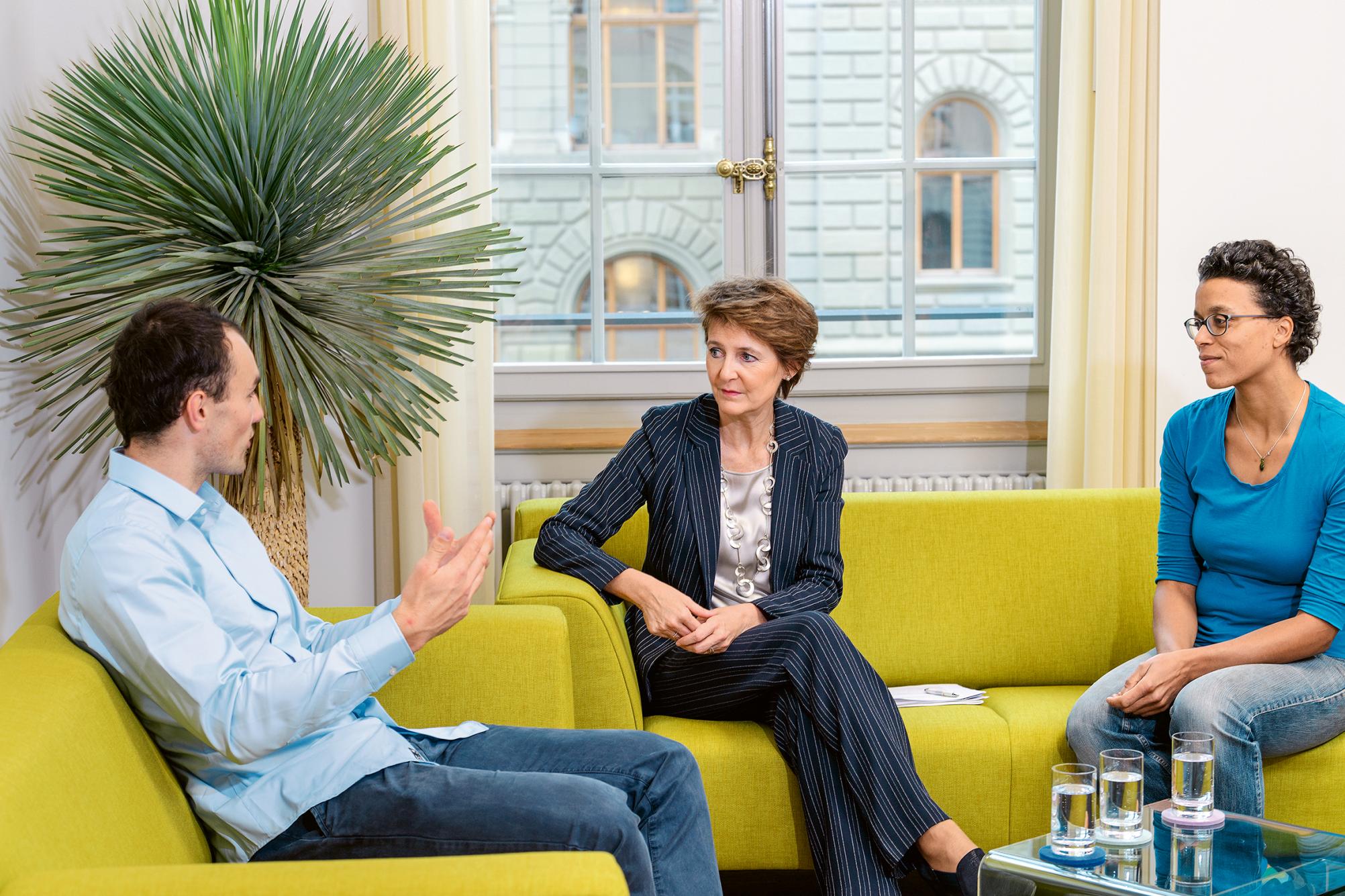THE PRESIDENT, THE FARMER AND THE SKI RACER
Switzerland is particularly affected by climate change. People such as ski racer Daniel Yule and farmer Valérie Piccand experience that first hand. President Simonetta Sommaruga discussed the issue with them. All three agree that higher temperatures, melting glaciers and extreme weather events present very real challenges. However, if we take the right measures, they could even serve as an opportunity – for a climate-friendly and innovative economy, for science and tourism.

President Simonetta Sommaruga (PSS): You both spend most of your days outdoors. How is climate change affecting your work?
Valérie Piccand (VP): On our farm in the Bernese Jura, we can experience water shortages after just two weeks of hot weather. We are also seeing more extremes in terms of the cold and heavy rain. The tendency has increased in recent years. And that’s why we’re adapting the way we run the business to take account of climate change.
PSS: What does that involve exactly?
VP: We complement the grass in our meadows with plant varieties that are more resistant than the usual grasses, and we keep breeds of cow that are capable of producing enough milk with a bit less feed.
Daniel Yule (DY): Weather fluctuations have become more common in the Alps too. One day we can be skiing in -10 degrees and the next day the sun is blazing down so much you can practically see the snow melting away. That makes training difficult.
PSS: Your experiences seem to confirm the scientific findings: climate change is having a big impact on Switzerland.
DY: Yes, the glaciers are disappearing at a horrific rate. At some glaciers we train on it’s not even possible to get back to the mountain station without having to take off our skis. A few years ago that was never a problem at Zermatt, for example. The snowline has been rising in recent years too.
PSS: I’m impressed that young people such as yourselves are noticing these differences so markedly. That just goes to show how quickly climate change is progressing. What measures do you think politicians should be taking to protect our climate?
DY: It can’t be right that a flight from Geneva to London is cheaper than taking the train from Martigny to Zurich. So I think it’s only fair for a tax to be levied on plane tickets. In general the price of a product should cover the cost to the environment of making it.
PSS: I totally agree. The impact of our behaviour on the environment has its price. And I’m certain that most people are willing to pay that price as they understand that you have to pay for the damage you cause.
VP: But it’s not just transport. Agriculture too should do its part to protect the environment. It also produces greenhouse gases. I would like to see the state help us to reduce emissions and improve energy efficiency on farms. There’s a lot we could do: Land used for farming stores large amounts of CO2. And if our cows eat grass from the meadow instead of imported soya then that too is good for the environment. But it’s also good for animal wellbeing, the quality of the food we produce and for farmers’ incomes. Focusing on Swiss milk and locally produced meat: that’s a huge opportunity for farmers!
PSS: Measures to protect the environment are an opportunity for the economy: for businesses that install solar panels, or for researchers that work on developing climate-friendly technologies. That creates jobs and provides a boost to the export industry.
DY: Climate change can also be an opportunity for tourism. Destinations that until now have been heavily focused on winter tourism are finding that the summer months are becoming more important – and that they don’t need snow for those activities.
Change is possible.
PSS: I like your examples. They show that although climate change presents us with challenges, we can turn it into something positive. The climate goals we have set are designed to make us less dependent on oil and gas. If we can replace these sources of fuel with home-grown solar and hydropower, we are investing in Switzerland instead of abroad and increasing the security of supply. After all, sun and water are more reliable than oil sourced in Libya or Kazakhstan.
VP: The farming industry can help with these clean sources of energy. Barn roofs have plenty of space for solar panels.
DY: The initial outlay for solar panels and heat pumps may seem expensive today, but in the long term it’s worthwhile because you can save so much energy that way. I still want to be able to show my kids how much fun it is to ski.
PSS: As for the future, by 2050 Switzerland wants to be climate neutral in terms of greenhouse gas emissions. You, Daniel, will be younger then than I am now. We’ve got thirty years to adapt to life without fossil fuels. The two of you are wonderful ambassadors with the work you do. You give us hope and show that change is possible!
Valérie Piccand (born 1979) is an agricultural engineer. She runs a livestock farm in Les Reussilles (BE) and manages grazing land. She is co-president of ‘Autrement’, a cooperative in Tramelan, which runs a farm store selling locally produced organic products.
Daniel Yule (born 1993) is a member of the Swiss national ski team. The slalom specialist from Valais won a gold medal in the team event at the 2018 Winter Olympics and at the 2019 world championships. As the athletes’ spokesperson at the International Ski Federation FIS, he often talks about the issue of climate change.